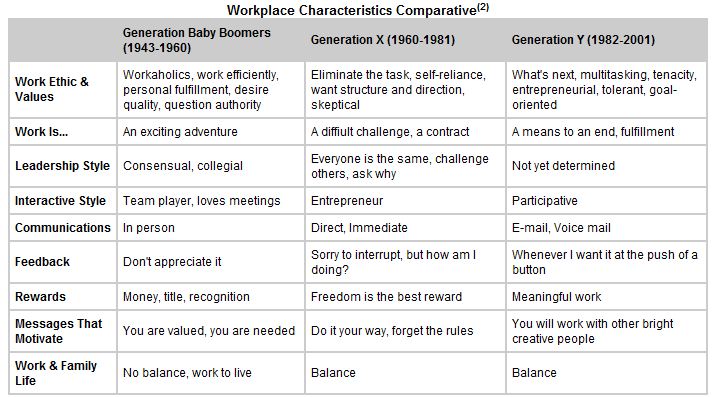There's something happening here, but you don't know what it is"
Today's post will be somewhat of a continuation of last week's (although you should have been expecting that, after all, this is a blog on a singular topic - it's all a continuation!)
For as long as this specific generation gap has existed, it's been criticized. Accusations, especially against Generation Y have been thrown about and widely accepted as fact. These accusations stand as the following1:
- **They (Generation Y) are dumber than we (Generation X) were at their age. "Today we are lying to ourselves about the renaissance the computer will bring. It will bring nothing. What it means is that the neo-cortex is finally eating itself." - Robert Bly
- **They're screenagers, Net addicted, losing their social skills and they have no time for sports or healthy activities.
- **They have no shame.
- **Because their parents have coddled them, they are adrift in the world and afraid to choose a path.
- **They steal.
- **They're bullying friends online.
- **They're violent.
- **They have no work ethic and will be bad employees.
- **This is the latest narcissistic "me" generation.
- **They don't give a damn.
The twenty-first century teen, connected and multitasked, autonomous yet peer-mindful, makes no great leap forward in human intelligence, global thinking, or netizen-ship. Young users have learned a thousand new things, no doubt. They upload and download, surf and chat, post and design, but they haven't learned to analyze a complex text, store facts in their heads, comprehend a foreign policy decision, take lessons from history, or spell correctly. Never having recognized their responsibility to the past, they have opened a fissure in our civic foundations, and it shows in their halting passage into adulthood and citizenship."
The above list comes from the first chapter of the book, "Grown Up Digital" by Don Tapscott. I could not recommend this book more (it's already been given rave reviews by a variety of tech-based business leaders including: Google CEO and chairman Eric Schmidt; Editor in Chief of Wired, Chris Anderson; and Nicholas Negroponte, the chairman and founder of the One Laptop Per Child project).
However, the book is not all doom-and-gloom as suggested by the list above. In fact, Tapscott spends the rest of the book arguing against and proving the list to be completely wrong.
He lists the '8 Norms of the Net Generation3:'
- Freedom
- Customization
- Scrutiny
- Integrity
- Collaboration
- Entertainment
- Speed
- Innovation
 |
| Traditional (Gen. X) Office Space (image via Flickr) vs Google (Gen. Y) Office Space (image via Google) |
Employers, I will argue, have two options. They can refuse to adapt to the Net Gen, stick to their old hierarchies, and reinforce the generational firewall that separates the managers from the newly hired minions. But if they do, I believe, they will forfeit the chance to learn from the Net Gen - to absorb both their mindset and their tools of collaboration. In this complex business environment, that would be a bad choice. Instead, I think, the winners will be those companies in the corporate world who choose [to]...embrace the Net Geners' collaborative ways. 6
Education
As Tapscott discussed in the above video, Generation Y is changing education too (or rather, education needs to start changing for them). While the traditional style of teaching is the lecture format - Generation Y learns through their own norms to most effectively find, analyze, synthesize, and collaborate in learning. They are the first generation of interactive learners, they don't want to just sit and listen, they want to do and apply as they learn. 7
Relationships
When Baby Boomers were young, the family was organized into a hierarchy: Dad was at the top as the highest in command; Mom came next as second in command; and below her, the children.
Since that time, things have shifted and now children (Generation Y specifically) are in the middle of it all. Why? Because Generation X parents are more democratic and less authoritarian in their parenting styles. And, for the first time ever, the child has a role in the family as the "Tech expert," an authority on something. While parents were previously the experts in everything in the household and had a stricter parenting style; because of the generation gap in technology, they must now defer to their children when it comes to one of the most important aspects of daily life in the 21st century - Technology. 8
Thoughts, Comments, Questions
I had hoped to use a questionnaire to be answered but it didn't really get the response I was hoping for (it actually got...no response which was, honestly - more than a little disappointing. )
However, I have received a couple of comments on Facebook and here on the blog, regarding the topic of Generation Gaps in Technology, and I thought I'd take a moment and highlight/respond to them!
Facebook Comments
I am sure your parents understand the importance of music (they were teenagers during the 80s after all). However, it's important to keep in mind that they grew up during a time that didn't allow for the level of music customization that you're used to now. Your parents were limited to listening to whatever was being played on the radio. However, you have access to thousands of songs through websites like last.fm, grooveshark.com, itunes.com, and on amazon.com. You can download a huge variety of music genres and then arrange it on your iPod in any way you like. Generation X grew up having specific music selections served to them by whatever corporations were in charge of their favorite radio stations. To them, the idea of spendings hours picking out songs and arranging them into playlists is just a bit unusual, and seems way to time consuming.
I often wonder if Generation X's cautious (ie reading manuals) approach to technology is sometimes just another way that their technophobia shows itself. There's an interesting essay by Harold Hellman called "Technophobia" in which he tells a story about his friend who couldn't get along with his manual transmission car, even after being taught ways to get to car to work better, his friend just couldn't cope with the technology fo the vehicle and wound up having to pay more for an automatic! 9 Generation Y (us) can just use technology because we grew up with it - it's not even technology to us, it's just life.
I honestly don't think that there's a right or a wrong when it comes to this topic. I think it really has more to do with adaptation and the more efficient application of technology. While it's still your choice whether you want to go analog or digital when it comes to most things, there are a variety of items, services, etc. that are making the jump to digital.
For example, you can no longer watch analog TV, it's all broadcast in digital, and in order to watch it on a TV that doesn't have a build in digital connection, you have to buy an adapter for your television in order to access basic channels.
Another example is banking, a lot of banks are using paperless statements (you actually have to specifically request that the bank send you a paper bank statement). And a lot of government documents are no longer completed on paper and sent in via snail mail, but instead you're required to fill out forms online and send them via e-mail.
However, you can still choose to go analog when it comes to a variety of things (although in some cases it's becoming more difficult - for example, you can still take film based photos, but developing them is no longer as easy as it used to be, places like Wal-Mart no longer process film so you're forced to either develop yourself in a dark room OR you can send them away to a higher-priced development lab).
The reality is that while analog still exists (for now), the transition of everything to digital is happening, and if you're going to absolutely insist upon nothing but analog, you're gonna have a hard time living in the 21st century.
Works Cited
[1] Tapscott, Don. Growing up digital. New York, NY: McGrawHill, 2009. 3-5. Print.
[2] Tapscott, Don. Growing up digital. New York, NY: McGrawHill, 2009. 2. Print.
[3] Tapscott, Don. Growing up digital. New York, NY: McGrawHill, 2009. 5. Print.
[4] Tapscott, Don. Growing up digital. New York, NY: McGrawHill, 2009. 160-169. Print.
[5] McLeod, , Dir. Did You Know; Shift Happens - Globalization; Information Age. Youtube: 2007, Film.
[6] Tapscott, Don. Growing up digital. New York, NY: McGrawHill, 2009. 150. Print.
[7] Tapscott, Don. Growing up digital. New York, NY: McGrawHill, 2009. 121-147. Print.
[8] Tapscott, Don. Growing up digital. New York, NY: McGrawHill, 2009. 224-225. Print.
[9] Hellman, Harold. "Technophobia." Technology and Man's Future. Albert H. Teich. New York: St. Martin's Press,
1981. Print.
Video - TEDxToronto, , Dir. TEDxToronto - Don Tapscott . Perf. Tapscott, Dan. Youtube (TEDxtalks): 2009,
Film.









